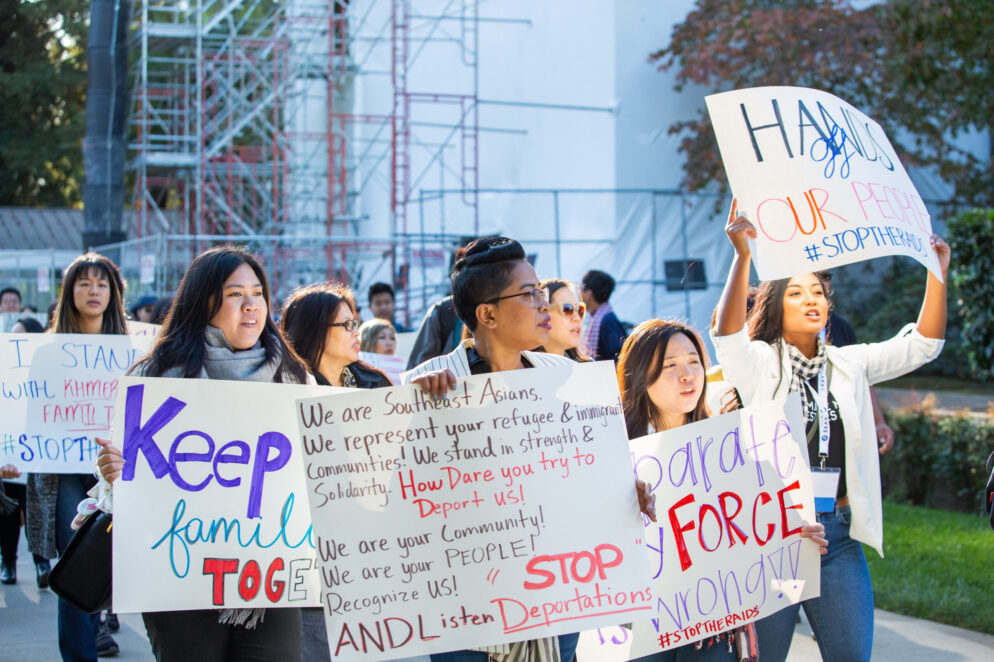Resources for Southeast Asian Refugees Facing Deportation

This webpage provides resources and answers to frequently asked questions for people facing deportation to Cambodia, Laos, and Vietnam. It does not provide legal advice.
If you are a California resident seeking legal advice regarding a removal order, please contact the Asian Law Caucus at (415) 896-1701 or use this contact form. If you live outside of California, please refer to the National Immigration Legal Services Directory or the resources below listed by state.
For additional information, refer to this frequently updated resource page from the Asian Law Caucus.
For questions regarding the information on this page, please reach out to immigration@searac.org.
Table of Contents
Community Resources
Status of ICE Deportations to Southeast Asian Countries
Q&A
Community Resources
- Resource Guide for Southeast Asian Americans Facing Criminal Deportation (SEARAC)
- Guide to Filing Lawsuit to Request Release from Indefinite Immigration Detention (Zadvydas Habeas Guide) (Asian Law Caucus)
- Post-Order Custody Review Guide (Asian Law Caucus)
- Guide to Requesting Records (Asian Law Caucus)
- From Prison to ICE to Freedom: A Handbook for Immigrants Inside (Asian Law Caucus and Asian Prisoner Support Committee)
- Know Your Rights Resources in English, Khmer, Hmong, and Vietnamese (MN8)
- Know Your Rights mobile app on Apple and Android (NAKASEC)
- National Immigration Legal Services Directory (Immigration Advocates Network)
- How to Find a Loved One After a U.S. Immigration Arrest, including in Vietnamese (National Immigration Law Center)
- Toolkit: Lost in the U.S. immigration detention system (Freedom for Immigrants)
- Resources of Southeast Asian Philadelphians Facing Deportation Due to a Criminal Conviction (VietLead)
- SEAFN Deportation Resources (Southeast Asian Freedom Network)
Additional resources
- Guide to California Pardons (Asian Law Caucus)
- California Clemency Advocacy Guide (Asian Law Caucus)
- Legal Help Hotlines (AJSOCAL)
- English: (888) 349-9695
- Khmer: (800) 867-3126
- Vietnamese: (714) 477-2958
- Washington State Intake Form (KhAAG)
Status of ICE Deportations to Southeast Asian Countries
This page will be updated as we learn of changes in policy or practice during Trump’s second administration. The Asian Law Caucus is also tracking updates on their resource page here. Last updated: September 2025
Cambodia: Cambodia signed a repatriation agreement with the U.S. in 2002. Since then, over 1,000 people have been deported from the U.S. to Cambodia. The deportations picked up speed in the fall of 2017, when the U.S. cut off visas for certain high-level Cambodian government officials until they start cooperating with U.S. deportation policy. Cambodia will not issue a travel document until after interviewing a person. Prior to the pandemic, Cambodian officials traveled to the U.S. each year to conduct interviews at a detention facility, and ICE carried out raids targeting Cambodians with removal orders in preparation for the interviews each year. Since the covid-19 pandemic, arrests have been fewer and more sporadic, and Cambodian officials are continuing to conduct some interviews virtually. There are about 1,700 Cambodians with removal orders in the U.S.
A nationwide permanent injunction currently requires ICE to send written notice to some Cambodians before re-arresting them. If you were previously released from detention after being ordered deported and have complied with your order of supervision, you should be included in this group. ICE must provide class members a one-time notice that
- reminds them of their deportation order and the possibility of re-detention;
- informs them about their legal options to prevent deportation; and
- includes important immigration and criminal conviction documents to help them explore their legal options.
The one-time notice does not tell a class member if they will be re-detained soon, or at all. Instead, the notice is intended to prompt class members to explore their legal options, including whether they might be able to reopen their immigration proceedings. However, this requirement of the one-time notice is still being finalized by the courts. Until the courts approve the final one-time notice, after which the one-time notice will be sent to all class members, ICE is required to instead give a 2-week notice of re-detention to class members. Therefore, eligible Cambodians may expect a 2-week notice of re-detention at least through the end of 2025. Contact ALC if you notice any violations of the 2-week notice requirement.
Read the Asian Law Caucus’ community advisory on the one-time notice requirement.
Laos: Laos does not have a formal repatriation agreement with the U.S. In June 2025, the U.S. placed a travel ban on Laos and cut off visas for certain Lao individuals citing visa overstays and failure to cooperate with U.S. deportation policy. The Lao government has been issuing travel documents in response to pressure from the U.S. There are over 4,800 people considered by ICE to be nationals of Laos who have removal orders and are living in the U.S. This number includes Hmong, Mien, and other ethnic minority groups.
Vietnam: In November 2020, Vietnam and the U.S. signed a new repatriation agreement, which replaced the previous 2008 agreement. The 2020 agreement created a process for “pre-95” immigrants to be deported in addition to the “post-95” immigrants covered by the 2008 agreement. Before 2025, Vietnam was generally only issuing a handful of travel documents for “pre-95” immigrants each year. Now, ICE has begun to redetain and deport pre-1995 immigrants at significantly higher numbers than it had previously. Find more resources here from the Asian Law Caucus for Vietnamese immigrants who entered the U.S. before 1995.
Q&A
Know Your Rights
When may ICE enter my home?
Immigration officers may not enter your home without permission unless they have a “warrant.” A warrant is a document issued by a court. Generally, ICE claims that a document signed by a deportation officer not a judge is a warrant. This document does not authorize them to enter your home without permission. It is important that everyone in your household knows to not open the door for ICE. ICE can enter your home if anyone gives them permission to enter. They will treat opening the door as permission and push their way in.
For more information, please see Know Your Rights with ICE from the Immigrant Defense Project.
What should I do if ICE is at my door?
Do not open the door. Through the door, ask which agency the officers are with. ICE officers often falsely claim to be police. Ask if they have a warrant and for them to slide the warrant under the door. Check to see if the warrant was signed by a judge or deportation officer.
You can print out cards to inform the ICE officer that they do not have permission to enter and that you do not wish to speak to them. The cards are available in English, Khmer, Hmong, and Vietnamese.
What if ICE is waiting outside my home?
ICE does not need a warrant signed by a judge to arrest you outside of your home. Often, ICE waits down the street until people leave for work to arrest them. If you are arrested by ICE on the street, you have the right to not answer any questions and to ask to speak with your attorney. If a friend or family member is arrested by ICE, call your local rapid response network right away for help. If you’re in California, see here.
ICE called or sent a letter asking me to check-in earlier than scheduled. What can I expect?
While ICE sometimes does reschedule check-ins, this may also mean that they are planning to detain you. Call the Asian Law Caucus at (415) 896-1701 for legal advice and updates on whether raids are happening elsewhere.
Common Questions
I was born in a refugee camp in Thailand, Hong Kong, or the Philippines. Am I a citizen of that country?
No. Those countries do not automatically grant citizenship to people born in the country.
Can I be deported to Cambodia, Laos, or Vietnam even if I was not born there?
Yes. Cambodia has recognized people born in refugee camps as citizens even though they have never been to Cambodia. Lao nationality law automatically strips people of citizenship if they have been gone from the country for more than seven years without permission. However, Laos has received individuals born outside of the country.
I have a deportation order. What can I do to prepare?
You should request your immigration file and criminal records and ask an attorney to review them. Find information on how to request your file. You can also make financial and parenting plans if you are detained. Find information on how to make parenting plans.
Can I reopen my case?
Possibly. Immigration law is constantly changing. You should request your file and have an immigration attorney review it.
Will it help if I get my conviction expunged? What about a pardon?
Generally, expungements will not help except for very limited situations. Vacating your conviction may help. If you have a state conviction, a pardon from the governor may also help for some convictions. If you have a state conviction, you would need to apply for a pardon in the state where you were convicted. If you have a federal conviction, you would need to be pardoned by the president. The pardon process varies greatly from state to state. You can get information on the pardon process in your state. If you live in California, you can also read the Asian Law Caucus’ pardons guide.
What happens if ICE arrests me?
If you are arrested by ICE, have a family member or friend immediately call your local Rapid Response Network to try to get day-of assistance.
If your friend or family member has been arrested and sent to an ICE detention center in California, call the Asian Law Caucus at (415) 896-1701 for legal help.
Generally, ICE detains people in a jail or detention center near where they live. For Cambodia, people are then transported from across the country to a centralized location to be interviewed by the Cambodian government. The location varies each time. After interviews, people are usually brought back to where they were initially detained.
I do not have a deportation order but am in removal proceedings. What are my options?
You should speak to an attorney about your case, and call the Asian Law Caucus at (415) 896-1701 for legal help, or another network listed under the “Community Resources” section. You can also consult SEARAC’s guide for resources and background information.

